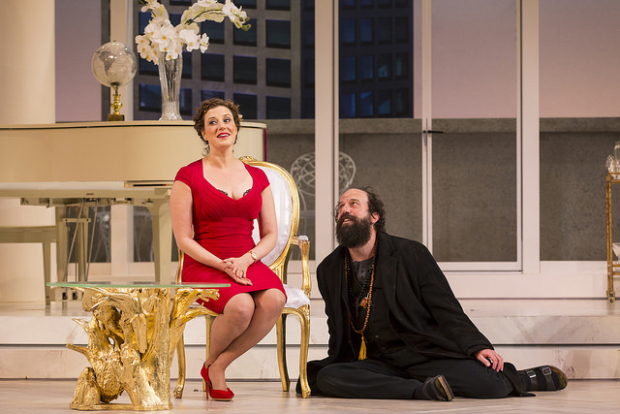Tartuffe

(© T. Charles Erickson)
It is no coincidence that the Huntington Theatre Company's production of Tartuffe takes place in a gold-plated, high-ceilinged 5th Avenue penthouse with striking views of New York and is guarded round the clock by the Secret Service. If director Peter DuBois did not mean to stress the play’s connection to certain folks now living in Washington, D.C., rather than Manhattan, then Alexander Dodge’s scene design certainly brings them to mind thanks to a set that reeks of the nouveau riche. The family who inhabits Molière’s play about the rewards of hypocrisy and the power of lies on the gullible among us seems uncomfortably familiar in this up-dated version.
The play begins with Orgon's family complaining about their father’s blind adoration of his house guest, Tartuffe. When Orgon (a robot-like Frank Wood) comes home, he’s like a stranger, declaring his loyalty to Tartuffe rather than his family. Perhaps his affections for Tartuffe are no wonder, since his mother, Madame Pernelle (Paula Plum), is a battle-ax, complete with a designer suit and imperious manner; his daughter, Mariane (Sarah Oakes Muirhead), a Valley-girl-brat, overdressed in be-ruffled, hot pink and black lace; and his son, Damis (Matthew Bretschneider), a self-absorbed, selfie-taking layabout with no visible ambition.
In a delayed entrance made in actor’s heaven, Tartuffe (comedian and actor Brett Gelman), the Bible-spouting, hair-shirt-wearing religious fanatic, finally appears near the end of the first act. (Unlike Molière’s play, there are only two acts in this production). He is followed by an acolyte (Steven Barkhimer) whose facial expressions and costume are ripped straight from a Mel Brooks movie. Gelman looks more like old photos of Rasputin than a contemporary charlatan, complete with dirty-looking clothes, a Turkish-style hat, and large cross on his breast. He also wears a leer on his face as he lusts after Orgon’s second wife, the trophy-like Elmire (Melissa Miller), and adopts a knowing slant to his eyes as he contemplates his mark, the gullible Orgon. The characterizations by the actors are enhanced by a high-fashion, highly expensive-looking set of costumes, especially for the women, all designed by Anita Yavich.
It's left to the family maid, Dorine (a smart-mouthed Jane Pfitsch), to get the kids moving to save their lives from Tartuffe’s domination even as Orgon refuses to listen to reason from her or his brother-in-law, the reasonable Cleante (Matthew J. Harris), or even the sexy Valere (Gabriel Brown), Mariane’s fiancé. The famous scene where Orgon hides under the table to watch Tartuffe advance on Elmire and finally unmasks him is a hoot, enhanced by enough sexual harassment moves to equal the current headlines.
With little trouble, DuBois transferred the play from the 17th century to contemporary times, largely through the translation by Ranjit Bolt which enlists contemporary slang to express sentiments that Molière would have recognized, while keeping the characters' tics intact. Madame Pernell turns on her son’s wife for not recognizing that Tartuffe is a saint, declaring, "You are the stepmother from Hell!", while Dorine, the saucy maid, retorts, "He’s pulled the wool right over yours, but our eyes see the hypocrite," in rhyming, eight-syllable lines. The dialogue is spilled out by the actors, who move as quickly as they spout the lines, which furthers the comic effect. Are the action and reactions believable? Perhaps not so much, despite the multiple sight gags and vaudeville-type pratfalls that are fun to watch. The actors as an ensemble are game for every and any physical action, including slithering over the floor, kneeling in prayer, while delivering a series of snarky double takes.
The climax, which Molière amended to pay homage to King Louis XIV, is also given a kick up to the 21st century, courtesy of a Flying by Foy special effect. The production ends with a dizzy-making, club-type curtain call for the entire cast, choreographed by Daniel Pelzig, further propelling us into the present with this tale from the past.











